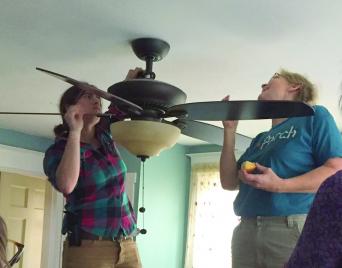
Fred & Wilma Revisited: Women Doing Home Repairs

From the time of the Flintstones, men have been the technology gatekeepers while women are the traditional experts in weaving and textiles, as well as wielding cooking and domestic tools. Construction, welding and general mechanical tasks have been men’s domain, perhaps because these often required more brute force. In modern times, even with power tools the norm, we still see this gender divide very clearly. It is one reason for the persistent gap in income between women and men, even when education is equal.
In my junior high school back in the 1960s, girls took Home Economics, a mix of cooking and sewing. Boys took Wood Shop and Metal Shop. That gender segregation has disappeared — but so has the curriculum. (In well-resourced schools, it has been replaced with “Maker Labs.”.)
Recently, I had the pleasure of visiting MIT’s famous D.Lab (d-lab.mit.edu), birthplace of many humanitarian technology innovations. Its core is a cavernous workspace hung with many different boards filled with collections of tools. Each array is carefully labeled: it is not presumed that students know these tools’ names. Perhaps it is to help non-English speaking students, but it also is very female-friendly. It’s also likely there are plenty of young men these days who don’t know a buzzsaw from a ball peen.
Women’s lack of familiarity with the world of tools can cost them. A study by World Bank gender specialist Markus Goldstein shows that when African women enter traditionally “male” enclaves like car repairs, they earn a great deal more than their counterparts in traditionally female-dominated sectors like food preparation and childcare.
Part of the challenge, then, is to broaden women’s ideas of desirable employment. Absent personal encouragement and mentorship, women rarely enter the trades.
Cindy Ariel, an Elkins Park owner of a big old house in need of upkeep, is a passionate gender-equality advocate; we met through her being the regional co-chair of Dining For Women. Cindy researched the lack of female home repair “handywomen,” curious what she’d find. The result of her investigation, combined with her visionary entrepreneurship, has been the launch of her new business, Think Outside of the Tool Box LLC.
Cindy has assembled a talented team of female fixers; they are sharing knowledge with each other and gaining more experience and expertise in furniture assembly, painting and trim carpentry as well as basic plumbing and electrical work. Think Outside of the Tool Box is a Weavers Way Local First participant, offering Co-op members 10 percent off their first job. And a portion of their work is donated to nonprofits helping to improve the quality of life for people living in poverty and/or working to empower women and girls.
You can read more about their innovative approach to women’s inclusion in the world of home repair at www.outsideofthetoolbox.com. Interested in learning more about training and work opportunities? Contact cindy@outsideofthetoolbox.com; Cindy has become a great networker and resource for women interested in expanding their horizons — and earnings!
Weavers Way member Betsy Teutsch is the author of “100 Under $100: Tools for Empowering Global Women” (www.100under100.org).
